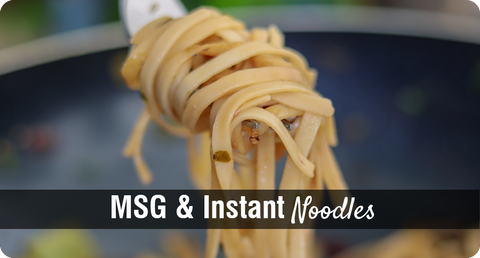Instant Noodles are pre-cooked, inexpensive, easy to prepare and very popular. Typical ingredients include refined flour, palm oil and salt. The flavouring packet contains MSG (monosodium glutamate) and high amounts of salt.
Most of the Instant noodles are low in protein, fibre and high in carbs and fats along with sodium. They are loaded with saturated fats when consumed regularly can raise the bad cholesterol levels in the blood.
Instant noodles are a poor source of both protein and fibre they won’t be able to make you feel full or support any kind of weight loss.
MSG (Monosodium Glutamate) is a very common food additive used to enhance flavour. MSG is labelled as harmful by some people as it is believed to cause excessive glutamate in the brain along with excessive stimulation of the nerve cells leading to harmful neurological effects.
Although large doses of MSG can raise blood levels of glutamate and increased glutamate activity in the brain can be harmful. But dietary glutamate does not affect our brain as it cannot cross the blood-brain barrier. There are no human studies to support the claim that glutamate from MSG leads to the destruction of nerve cells when consumed in controlled amounts.
Please note that: MSG is safe for consumption in controlled amounts, but higher doses can be dangerous. Also, if your body reacts to MSG, then its best to stay completely away from it. But MSG is often found in low quality processed food items which should be avoided in the first place when following a healthy balanced diet. So if you are eating whole foods and limiting your intake of processed, packaged food items then you need not worry about your MSG intake.
High amounts of MSG consumption is linked to headaches, nausea and increased blood pressure. MSG intake is safe in moderation, but people with sensitivity to MSG should limit their intake as they may experience symptoms like numbness, muscle tightness, tingling, headaches, etc.
Instant noodle consumption is associated with high intake sodium, fat and calories and low intake of vitamins, minerals and proteins. Its consumption is also related to increased risk of metabolic syndrome that increases the risk for diabetes, stroke and heart disease.
In conclusion, don’t make instant noodles a part of your daily diet as they have a very poor nutrition profile, but you can enjoy them in moderation. Maintain an overall healthy diet, and while choosing instant noodles try options that are made from whole grains and lower in sodium. Try adding healthy ingredients like protein and vegetable sources to enhance the nutrition profile of instant noodles.

